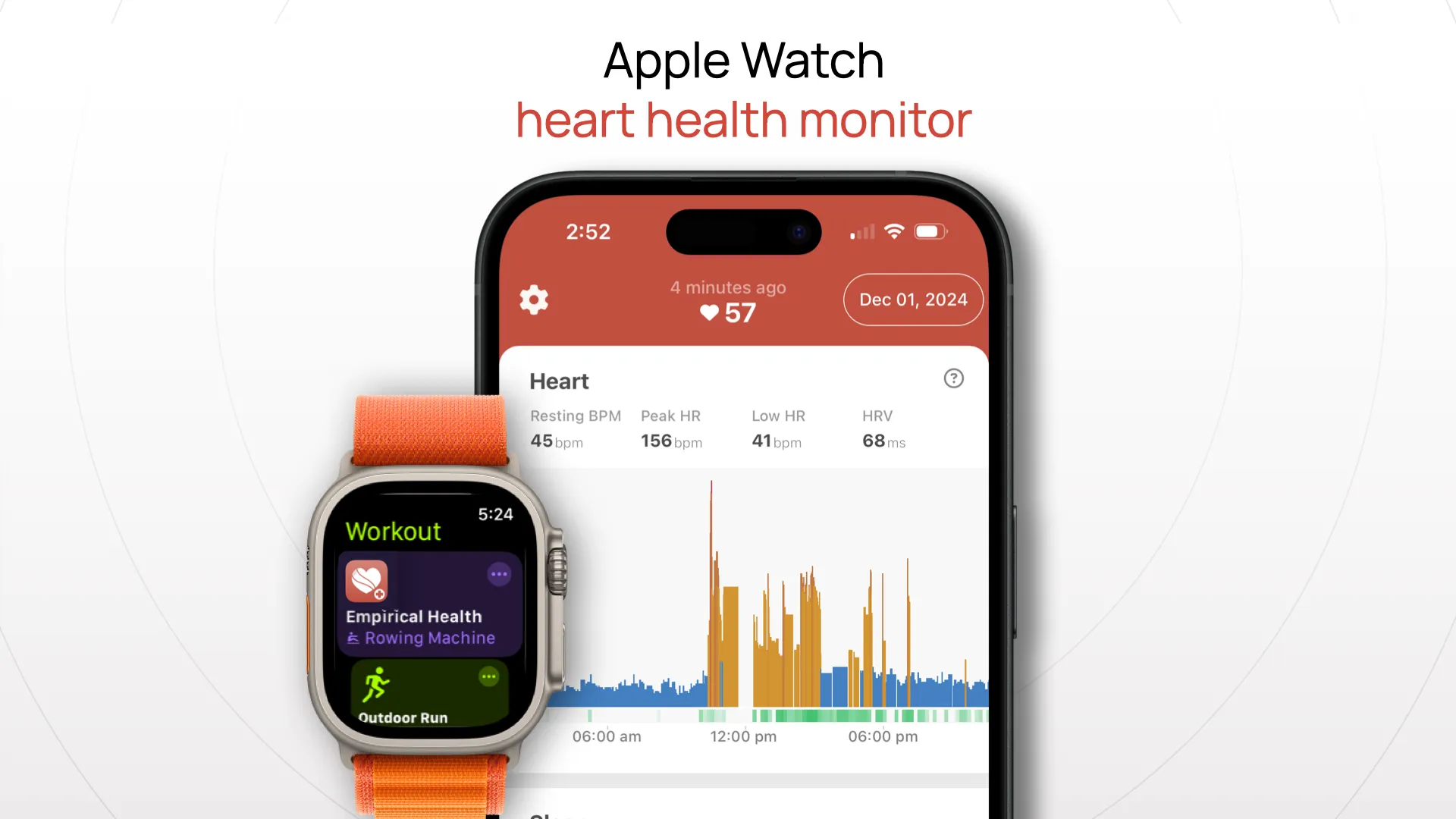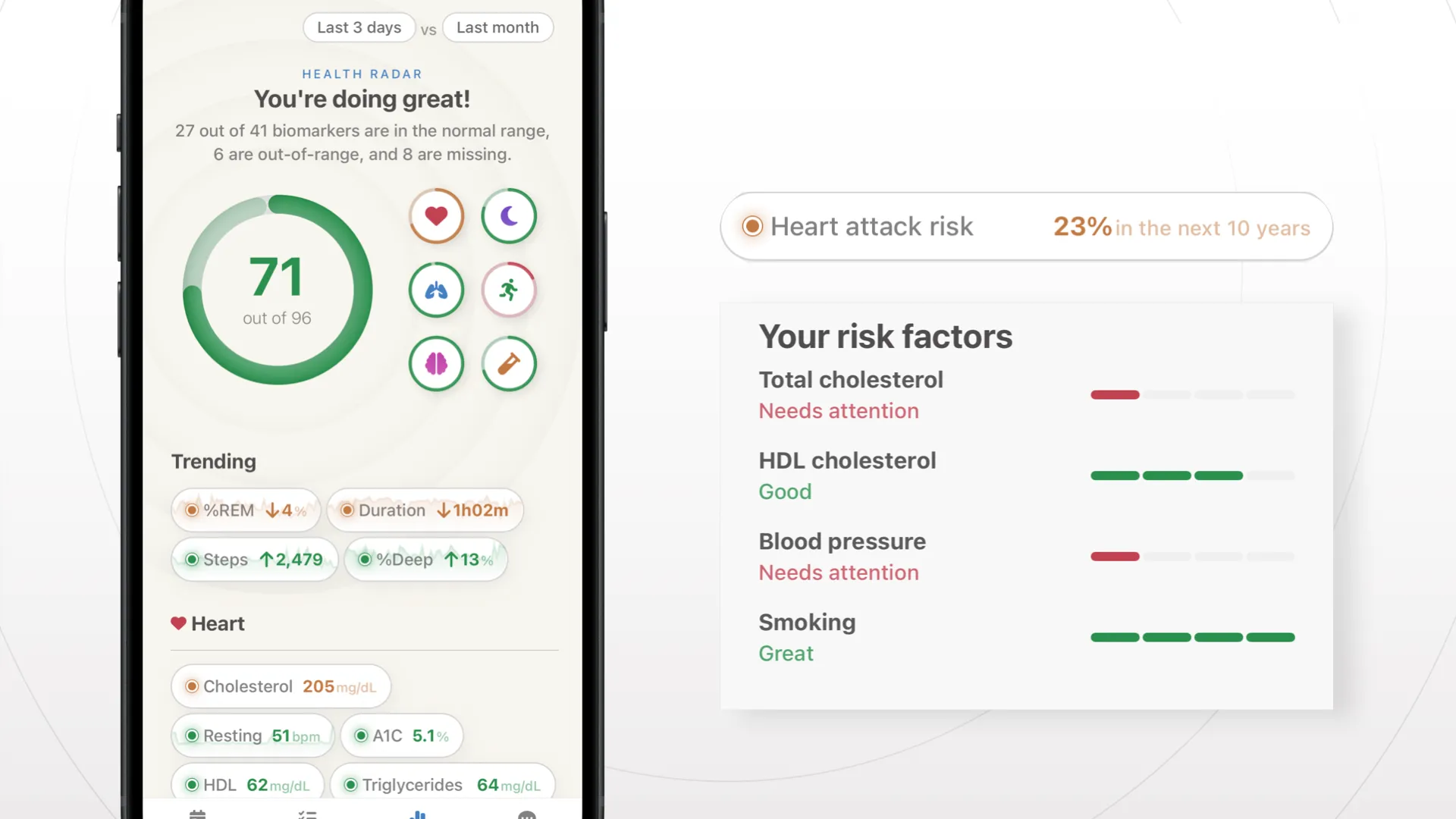Last updated: Nov 2025
There’s a surprising amount of signal locked in the humble heart rate monitor.
At Empirical Health, we’ve analyzed more than 3,025,980,708 heart rate measurements from Apple Watch. While the raw sensor data is surprisingly accurate—studies show that Apple Watch’s heart rate sensor is accurate to within 2.3 bpm—what’s more important is that the raw data can be transformed into 10 distinct biometrics that help you monitor your overall heart health.
The rest of this article explains the accuracy of the Apple Watch’s heart rate monitor, heart health biomarkers derived from it, how to use them to monitor your heart health, and details on how the Apple Watch’s heart rate sensor works.
 Apple Watch’s heart rate monitor. Screenshot from Empirical Health.
Apple Watch’s heart rate monitor. Screenshot from Empirical Health.
Accuracy of Apple Watch heart rate monitor
We wrote a separate article on the accuracy of Apple Watch’s heart rate monitor which covers both academic studies and Apple’s own validation testing.
Metrics derived from Apple Watch’s heart rate monitor
When we think about heart health, we can divide metrics into three buckets: measuring the health of the heart’s “pump”, “electrical system”, and “power supply”. The pump is the heart’s ability to pump blood, and the Apple Watch measures 7 metrics of overall cardiovascular fitness. The electrical system controls the heart’s rhythm, and Apple Watch measures 3 heart rhythm metrics. Blockages in the power supply (coronary arteries) are a heart attack — Apple Watch doesn’t measure this, but a blood test can. Last, heart rate variability (HRV) is a window into your nervous system and many internal organs.
Here’s the breakdown of each heart rate monitor metric and why it matters:
| Category | Metric | Why it matters to your health |
|---|---|---|
| Cardiovascular Fitness | Resting Heart Rate (RHR) | For every 10 bpm decrease in RHR, mortality goes down by 10-20%. |
| VO2 Max (Cardio Fitness) | Every 1 mL/kg/min increase in VO2 max reduces risk of death by 9 percent. | |
| Cardio Fitness Notifications | Alerts when cardio fitness is low for your age/gender, which may indicate increased health risks. | |
| Cardio Recovery (Heart Rate Recovery) | How quickly heart rate drops after exercise. Faster recovery suggests better cardiovascular fitness. Poor recovery can indicate heart problems. | |
| Walking Heart Rate | Average heart rate during walking. Elevated walking heart rate may indicate poor fitnes ](https://www.empirical.health/metrics/heart-rate-zones) | |
| Heart Rhythm | High/Low Heart Rate Notifications | Alerts for unusually high (>120 bpm) or low (<40 bpm) heart rates when inactive, which can indicate arrhythmias or other cardiac issues. |
| Irregular Rhythm Notifications | Detects potential atrial fibrillation, a common heart rhythm disorder responsible for 1 in 4 strokes. | |
| AFib History | Tracks the percentage of time your heart spends in atrial fibrillation (for diagnosed patients only). | |
| Heart Attack | N/A | Apple Watch does not measure heart attack risk; for that you need a blood test and a heart attack risk calculator. |
| Nervous system | Heart Rate Variability (HRV) | Higher HRV generally indicates a better functioning autonomic nervous system. |
How to use Apple Watch as a part of a comprehensive heart health program
A comprehensive heart health program requires tracking metrics of the heart’s pump, electrical system, and power supply (heart attack risk). While Apple Watch measures the first two, to measure heart attack risk, you need the results from a blood test plus a heart attack risk calculator. Empirical Health includes heart attack risk calculactor, as well as a comprehensive health score that combines your Apple Watch metrics with results from a blood test.
 Comprehensive heart health scores in Empirical Health, including heart attack risk derived from a blood test.
Comprehensive heart health scores in Empirical Health, including heart attack risk derived from a blood test.
Don’t have recent blood test results? You can order a blood test diretly through the Empirical app.
Closing thoughts
Wearables have evolved from simple fitness trackers to sophisticated heart monitoring devices. While they’re not a replacement for medical devices, the fact that you wear them every day makes them a valuable tool to take your heart health into your own hands.
Get your free 30-day heart health guide
Evidence-based steps to optimize your heart health.
